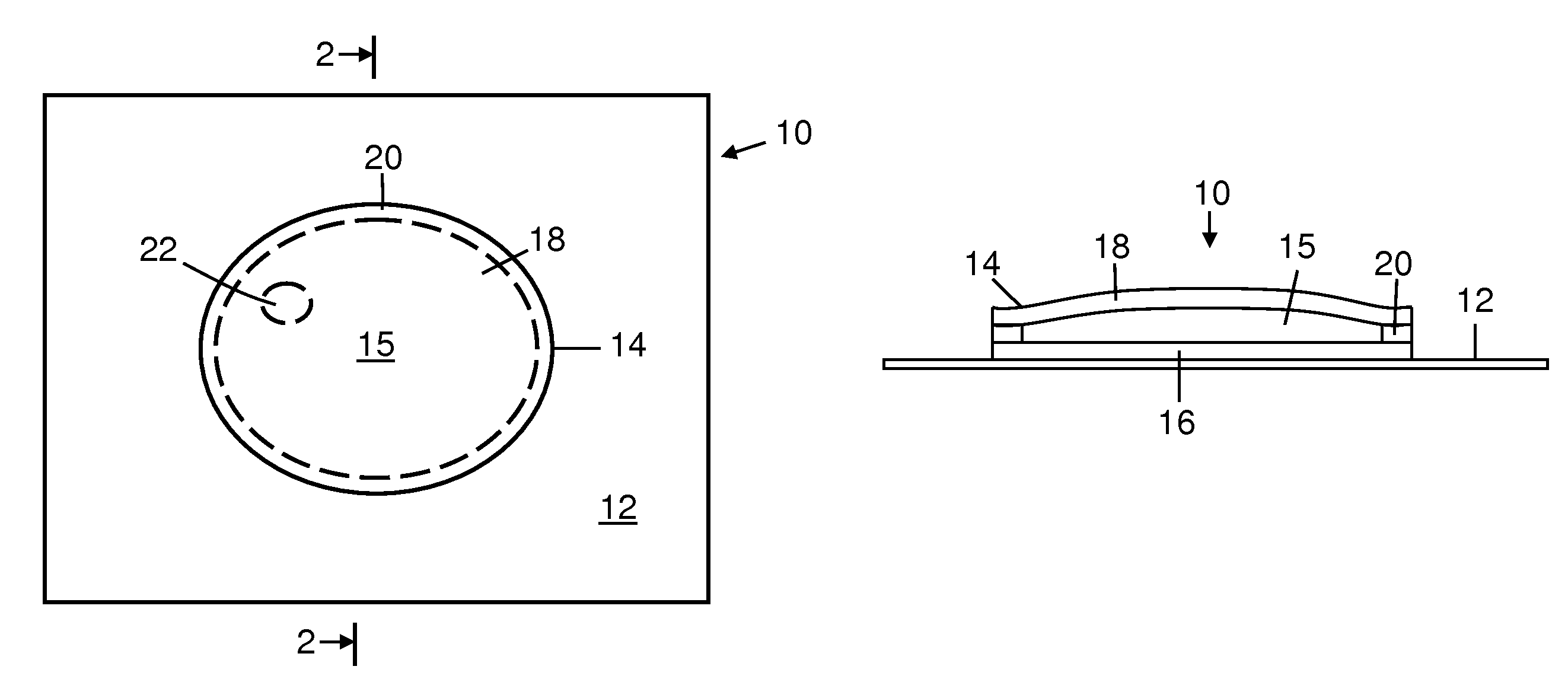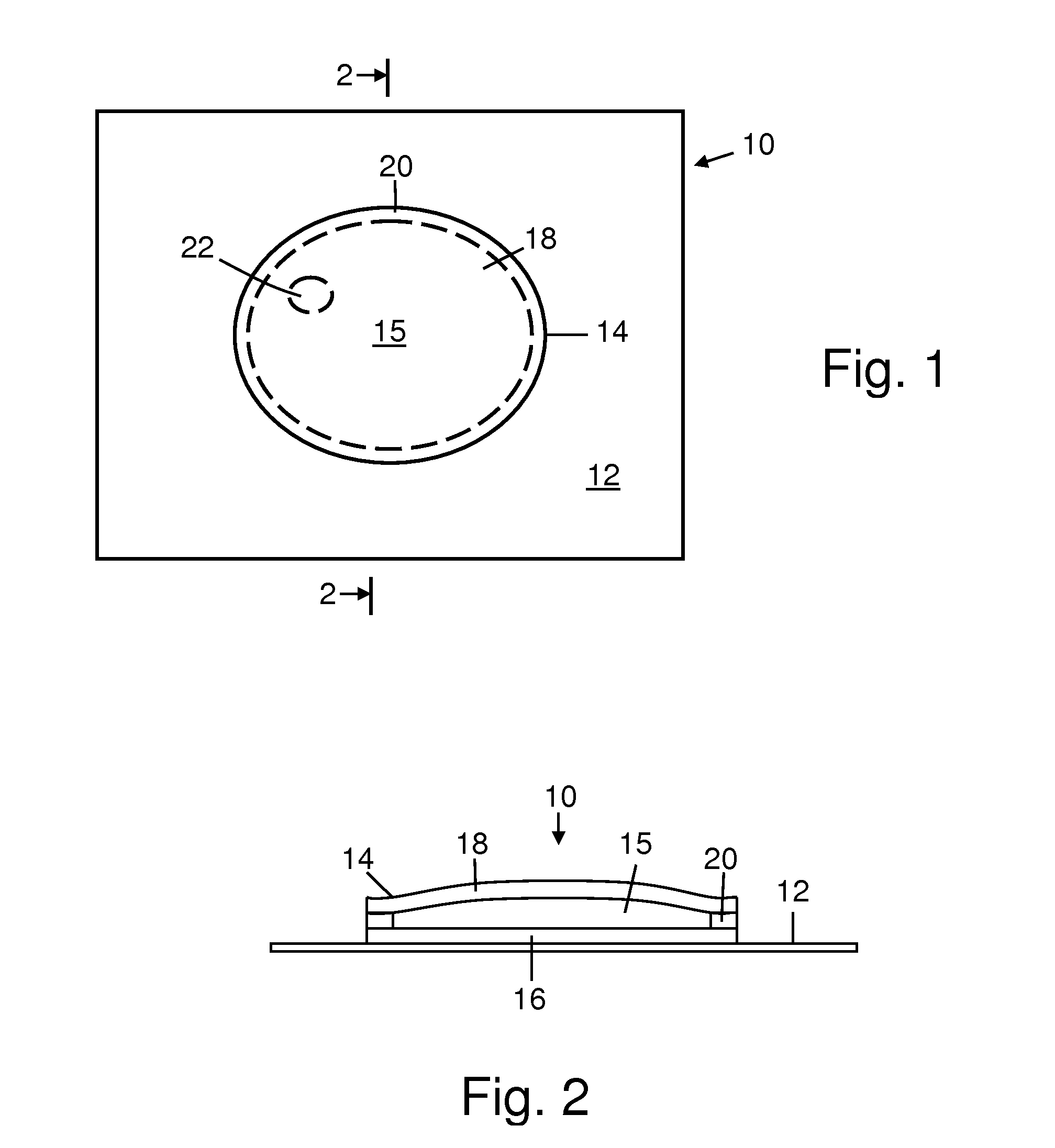Freeze indicators with a controlled temperature response
a technology of temperature response and indicator, applied in the direction of instruments, heat measurement, measurement devices, etc., can solve the problem of undue depression of the freezing point of the aqueous medium
- Summary
- Abstract
- Description
- Claims
- Application Information
AI Technical Summary
Benefits of technology
Problems solved by technology
Method used
Image
Examples
examples 1-7
Effect of pH on Freeze Indicator Dispersions
[0134]Seven wax dispersions, having different pH values, ranging from an acidic pH of 4.0 to an alkaline pH of 11.0, and other characteristics, as shown in Table 1A, are obtained from supplier Michelman Inc., Cincinnati, Ohio, and formulated into Examples 1-7, as is described below. In Table 1A, the “Wax pH” refers to the pH of the wax dispersion, the wax utilized in the wax dispersion is a paraffin / synthetic wax blend and the supplier's product code for the wax dispersion is as stated in the table.
[0135]
TABLE 1AComposition of Wax DispersionsDispersionProductSolids ContentEx.Wax pHMediumCode(wt %)111deuteriumDTOX130oxide29.5deuteriumTTX9.5D32oxide39.0deuteriumTTX9.0D33oxide48.5deuteriumTTX1D35oxide57.2deuteriumTTX3D30oxide64.7deuteriumTTX2D30oxide74.0deuteriumTTX14D30oxide
[0136]The wax dispersions employed all have a viscosity of less than 100 cps. These seven wax dispersions are formulated into freeze indicator dispersions for Examples 1-...
examples 8-27
Effects of Ice Nucleating Agent and Stabilizer Concentrations on Freeze Indicator Dispersions
[0150]The procedure employed in Examples 1-7 is repeated to provide the freeze indicator dispersions of Examples 8-27, using the proportions of ingredients shown in Table 2. As was the case in Table 1B, in Table 2, the proportions given are by weight and the ingredient total for each example is 100 so that the proportions are also percentages.
[0151]As with Examples 1-7, the actual weight of ice nucleating agent in each sample can be calculated, from the proportional value and the volume of the indicator assuming that the density of the indicator liquid is 1.0. Thus, employing an 80 μL aliquot of freeze indicator dispersion in each blister provides respective quantities of ice nucleating agent of 40 μg (Examples 8-10 and 17-19), 120 μg (Examples 11-13 and 20-23) and 200 μg (Examples 14-16 and 24-27.)
[0152]Examples 8-27 are arranged in two groups according to the pH of the wax dispersion emplo...
examples 28-32
Machine Prototypes
[0172]The procedure employed in Examples 1-7 is repeated to provide the freeze indicator dispersions of Examples 28-32, using the proportions of ingredients shown in Table 3. As was the case in Table 1, in Table 3, the proportions given are by weight and the ingredient total for each example is 100 so that the proportions are also percentages.
[0173]The weight proportion of wax indicator solids, based upon the weight of freeze indicator dispersion that is employed in each of Examples 28-32, can be calculated from the data in Tables 1A and 3 to lie within a range of from about 14.85 percent to about 20.95 percent. Similarly, the weight proportion of liquid medium, based upon the weight of freeze indicator dispersion, that is employed in each of Examples 28-32 can be calculated from the data in Tables 1A and 3 to lie within a range of from about 78.8 to about 84.1 percent.
[0174]In Examples 28-32, rather than using polypropylene vials, as is described in Examples 1-7, ...
PUM
| Property | Measurement | Unit |
|---|---|---|
| freeze-onset temperature | aaaaa | aaaaa |
| temperature | aaaaa | aaaaa |
| temperature | aaaaa | aaaaa |
Abstract
Description
Claims
Application Information
 Login to View More
Login to View More - R&D
- Intellectual Property
- Life Sciences
- Materials
- Tech Scout
- Unparalleled Data Quality
- Higher Quality Content
- 60% Fewer Hallucinations
Browse by: Latest US Patents, China's latest patents, Technical Efficacy Thesaurus, Application Domain, Technology Topic, Popular Technical Reports.
© 2025 PatSnap. All rights reserved.Legal|Privacy policy|Modern Slavery Act Transparency Statement|Sitemap|About US| Contact US: help@patsnap.com


